|
Getting your Trinity Audio player ready...
|
Publisher’s subscription focus, Amazon’s digital ad growth, eSports expansion, Facebook’s $350m for local news and a record-breaking GDPR fine for Google.
This is the fifth in our monthly series offering the most important data and research about the media and communications industries.
Here’s 10 key numbers from the past month which caught our eye:
1: Subscriptions the main revenue focus for 52% of publishers in 2019
“Subscription and membership models will become the key revenue focus for the news industry this year,” said the Reuters Institute for the Study of Journalism, as part of their annual Journalism, Media and Technology Trends and Predictions report for 2019.
“Over half (52%) expect this to be the MAIN revenue focus in 2019, compared with just 27% for display advertising, 8% for native advertising and 7% for donations,” wrote author Nic Newman. “This is a huge change of focus for the industry,” he added.
The finding was based on a survey of 200 media executives, senior editors and digital leaders across 29 different countries.
“Display and native advertising remain important today,” the report notes, “but the key focus going forward is on building or strengthening businesses around subscription and donations.”
Condé Nast is just one publisher moving further into this space, building on the success of its paywalls at The New Yorker, Wired, and Vanity Fair. It looks like others will follow suit.
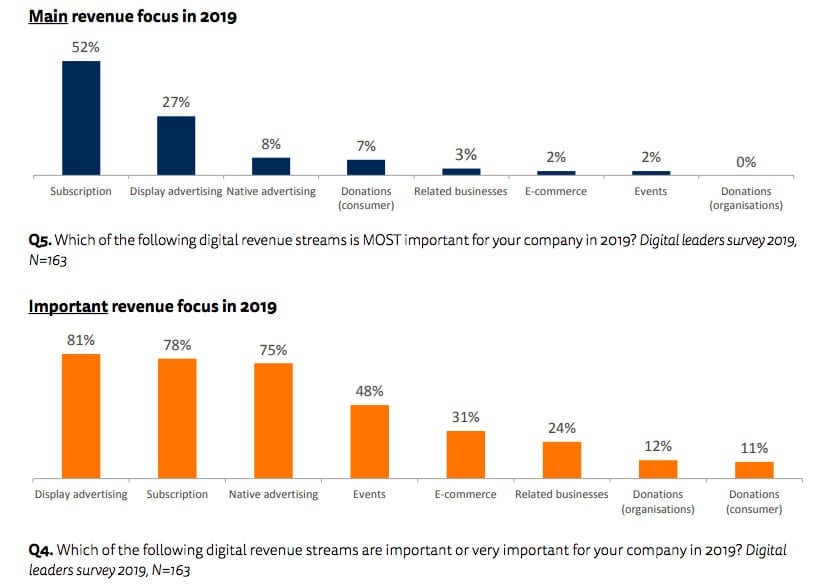
2: Amazon could be worth 12% of US digital ad spend by 2020
Research from Cowen, and shared by recode, revealed that “Amazon is expected to gain more digital ad market share by 2020 than any other platform,” .
In the next two years, Amazon’s ad revenue could double to 12 percent of the total US digital ad market.
The growth is likely to come at the expense of Facebook and Google, with privacy concerns being highlighted as a key driver for Facebook’s decline.
Based on a survey of 50 senior US advertising buyers in late December, “18 percent said privacy concerns would lead to decreased ad spend on Facebook,” Rani Molla wrote.
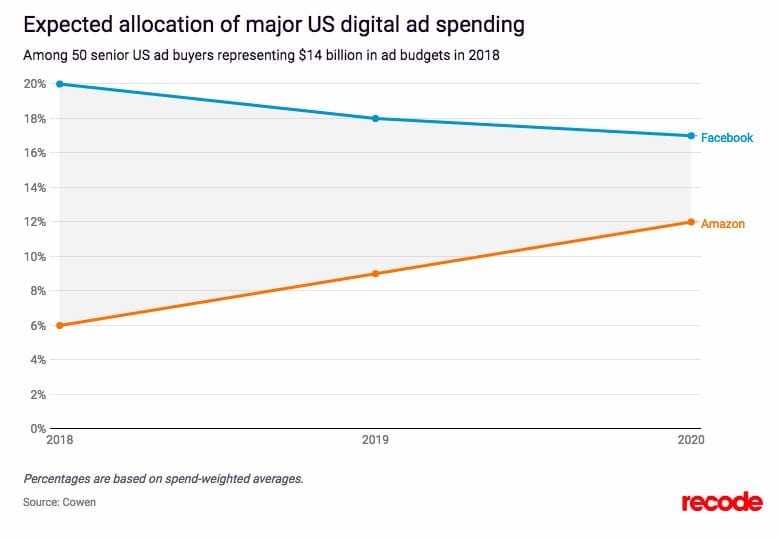
3: Facebook pledges $300 million to support journalism
“Over the next three years, we will invest $300 million in news programs, partnerships and content,” Campbell Brown, Facebook’s VP, Global News Partnerships announced in January.”
The move includes a range of initiatives including:
- $2 million investment in the Report for America initiative to place 1,000 journalists in local newsrooms over the next five years,
- $1 million investment into the Knight-Lenfest Local News Transformation Fund (which is “seeking to evaluate and improve how technology is used in U.S. newsrooms for newsgathering, product development and sustainable business models,”) and
- $1 million working with the Local Media Association (LMA) & Local Media Consortium (LMC): “to help more than 2,000 local member newsrooms better understand, develop and implement revenue streams through branded content both on and off Facebook.”
“We are also expanding our Accelerator pilot, which launched in the United States in 2018 to help local newsrooms with subscription and membership models,” Facebook said. “This year, we’ll commit over $20 million to continue the local Accelerator in the United States and to expand the model globally, including in Europe.”
“Overall, this investment is a relatively small one for Facebook,” Atlantic Media commented in their “The Idea” newsletter. “$300 million over three years will amount to about 0.12% of the global ad revenue Facebook is expected to bring in over that same period.”
Moreover, they pointed out, not all of this is new money.
“The $300 million also includes what remains of the $90 million Facebook had planned to spend on Facebook Watch videos. (It’s unclear exactly how much has been spent.) Some of the Watch funds distributed so far, but not the majority, have gone to local publishers [the focus of Facebook’s announcement], including Advance Local and McClatchy.”
4: In-app subscriptions worth $19.38 billion a year
“Consumers are expected to spend $120 billion in app stores in 2019,” Larry Dignan Larry Dignan observed over at ZDNet.
Citing App Annie’s State of Mobile report for 2018, Dignan outlined how “the most lucrative non-gaming apps of 2018 all contained in-app subscriptions.”
Publishers should note, that of these, “Netflix is No. 1 followed by Tinder and Tencent Video. Spending in 2018 was $19.38 billion, up from $11.9 billion, according to App Annie.”
More widely, there were 194 billion global app downloads in 2018, and “app store consumer spending topped $100 billion in 2018, up 75 percent from 2016.”
“Time spent in apps globally grew 45 percent from 2016 to 2018,” with social and communications apps accounting for 50 percent of time (720 billion hours) spent in apps.
The humble app, it would seem, is far from dead.
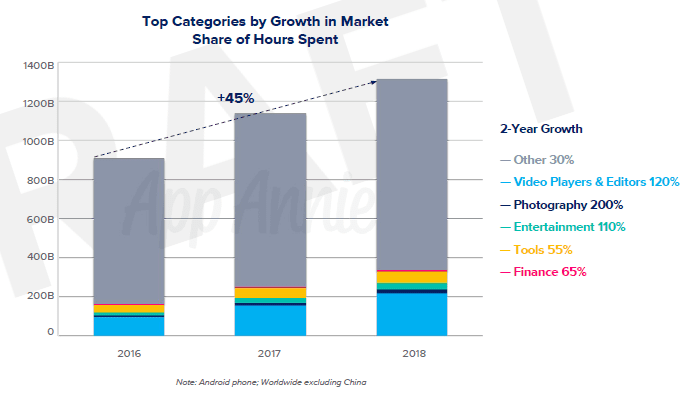
5: Over-the-air (OTA) TV households nearly doubles in eight years
In a similar vein, “over-the-air (OTA) TV—the programming that we all have access to even if we don’t have a cable or satellite programming subscription—is becoming a big thing again,” Nielsen has found.
In contrast to most pieces which focus on the rise of over-the-top (OTT) services, Nielsen shared that “there are over 16 million OTA homes in the U.S. That comes out to just over 14% of households.”
At the start of the decade, that figure was 11 million. “That’s an increase of almost 50% over eight years,” Nielsen said. It seems what’s old is new again.
As their research shows, it’s a complex and varied landscape. Many of these households still have access to services like Netflix, but they’re supplementing their TV diet with these on-demand products instead of cable.
“As an increasing number of consumers consider a more à-la-carte approach to their TV sources, there is opportunity for this segment to continue growing,” Nielsen predicts.
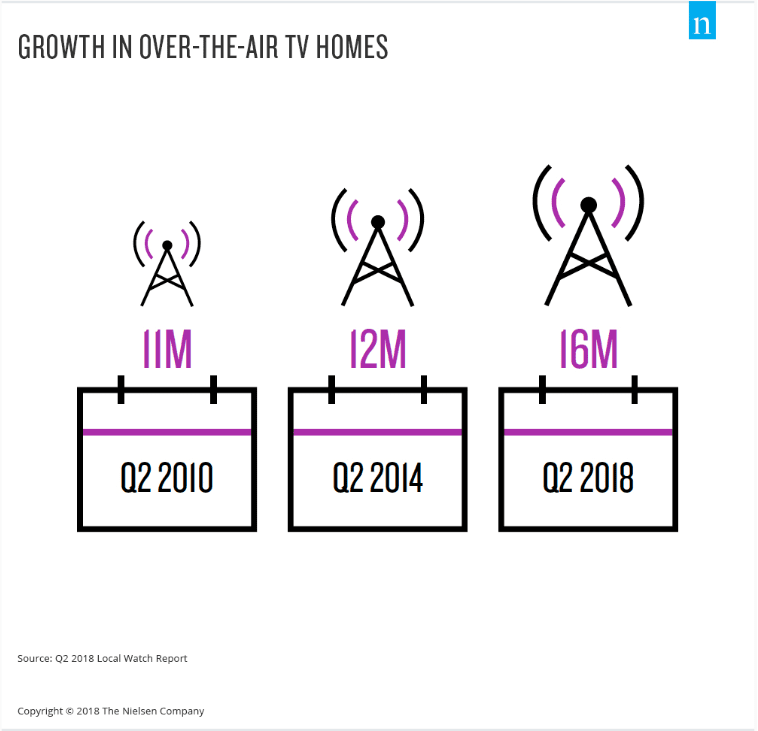
6: eSports market will expand by 35% North American this year
This was a key prediction in Deloitte’s 18th edition of their Technology, Media & Telecommunications Predictions, emphasizing that there are some new ideas around.
“The North American eSports market will expand by 35 percent powered by advertising, broadcast licensing, and franchise sales,” the company wrote, predicting that “North American eSports franchise leagues will expand into specific cities, following the professional sports model.”
“Could eSports help traditional TV broadcasters recapture young audiences?” they asked, noting that: “In 2018, Disney, ESPN, and ABC bought a multiyear license from Blizzard Entertainment to broadcast games and content for the eSports hit Overwatch.”
“The eSports phenomenon is large and growing,” they stated. “It offers traditional broadcasters an opportunity to access a young demographic of digital natives who are less engaged with TV and professional sports than previous generations.”
Moreover, “eSports programing could also potentially offer additional advertising revenues,” although they caution, “broadcast executives might not see the upside they associate with professional sports content.”
7: Amazon has sold more than 100 million Alexa enabled devices
“There are more than 150 different products right now with Alexa built in,” wrote Dieter Bohn at The Verge, “more than 100 of which shipped in 2018 and aren’t made by Amazon at all.”
“Depending on how you count, it’s either seriously impressive or a serious problem for Amazon,” Bohn said.
“On the one hand, 100 million pales in comparison to the number of phones that have either Siri or Google Assistant pre-installed. On the other hand, the word “pre-installed” is the key thing to pay attention to. With Alexa devices, you could argue, consumers are making an active choice to purchase an assistant instead of just getting a default.”
Separately, the Wall Street Journal reported (paywall) in November that the company “has more than 10,000 employees working on its Alexa virtual assistant and the Echo devices it powers.”
To give What’s New in Publishing readers an idea of just how much Amazon are ramping up these efforts, the Journal stated explained this is “double the staff in that division a little more than a year ago.”
8: Patreon now has 3 millions Patrons
Patreon, the membership platform for artists and creators, now has “more than 3 million patrons supporting more than 100,000 creators.”
In a blog post, the company also wrote that 2019 would see the company “pass 1 BILLION DOLLARS paid out to creators” since they launched in 2013.
“In 2019 alone, we’re on track to send creators more than half a billion dollars to fund their membership businesses, they added.”
“In just one year, the number of patrons around the globe increased from two million to three million,” Patreon said, “and the creators being supported include podcastors, illustrators, writers, musicians and more.”
“Patreon’s business is growing at a healthy rate,” Variety commented.
Payouts have been nearly doubling year-over-year for the past few years, and the company expects to surpass $1 billion in total payouts this year. In other words: Patreon will pay as much to creators this year as it has paid since its launch six years ago.”
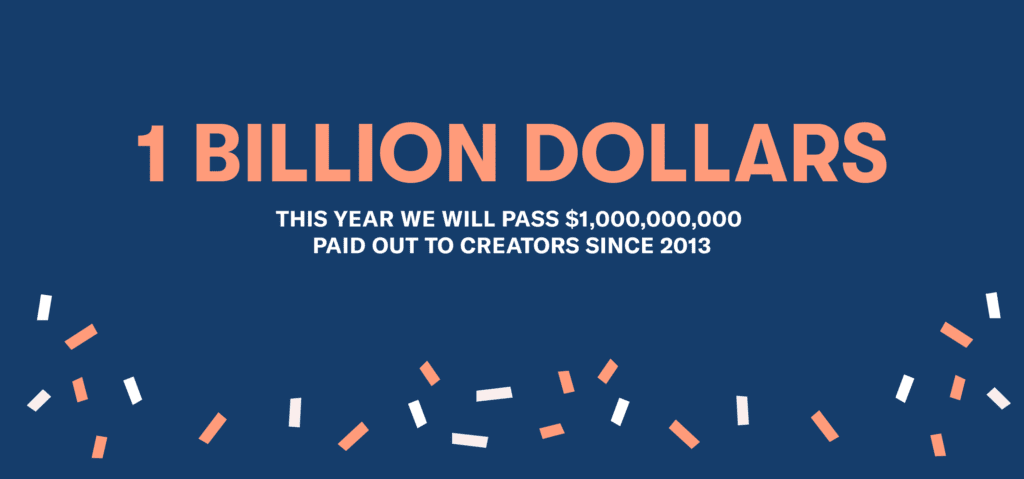
9: “Revenue for wearables is already more than 50 percent more than iPod was at its peak.”
This revelation from Apple CEO Tim Cook, was a key takeaway from an interview with CNBC’s “Mad Money” last month. (Read the transcript here.)
“AirPods are becoming ubiquitous out there,” Cook said. “People love them. I get notes every day. They’re chock full of tech. But they just work. It’s the elegance of them, but with significant technology and built right in and an unbelievable user interface.”
More widely, in a letter to investors, Cook stated that:
“Revenue outside of our iPhone business grew by almost 19 percent year-over-year, including all-time record revenue from Services, Wearables and Mac…. Wearables grew by almost 50 percent year-over-year, as Apple Watch and AirPods were wildly popular among holiday shoppers…”
Separately, TechCrunch reported that Google is buying Fossil’s smartwatch business, for $40m, perhaps signalling the start of a more aggressive move into this space (and one where Apple arguably leads the way) by the search giant.
10: Google fined €50m for GDPR breaches
Finally, France fined Google €50m for breaching GDPR requirements.
“This is the biggest GDPR fine yet to be issued by a European regulator and the first time one of the tech giants has been found to fall foul of the tough new regulations that came into force in May last year,” The Verge’s Jon Porter wrote.
Given the challenges of implementation that many companies have faced, it may not be long before the GDPR record books are rewritten once more.
Seen a stat or research paper worth sharing? Tweet us @wnip


